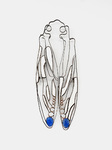Bernshammar, April 25, 2024
Dear Lulu,
Thank you for telling me about your grandmother, about how you learned to cast glass, about the door Lalique made during his time in Jersey, about your view on vulnerability, and about the tick that nearly killed you.
In my surroundings, the ticks woke up about a month ago. I found the first one in my dog’s fur after he had been running around in a field. They like to hide in his fur, those little creatures.
When I was growing up, ticks were only found in the southern coastal areas of Sweden. Now, the rising temperatures have enabled them to exist in almost the entire country. It’s a species perfectly adapted to our present time and probably also to the future – much like artificial intelligence. I don’t think this is a coincidence, as both ticks and algorithms are parasitic by nature. But at least we don’t have to worry about ticks during winter.
Something that struck me when you talked about the tick was that you didn’t express any aversion to it. You simply acknowledged that also ticks belong to your beloved garden. You also said that it’s somehow represented in your work. My impression is that ticks generally tend to evoke a lot of contempt. That’s probably due to several things: they’re parasites, they’re good at hiding, and they’re small. It’s somehow insulting that something so small can be so dangerous to us who are much bigger. Moreover, as Immanuel Kant notices, smallness is a quality that generally gives rise to contempt. Large animals and enormous objects that scare us instead have something sublime about them, like lions and nuclear power plants. But I also believe that contempt for the tick has to do with something else, more fundamental: We find it difficult to see what function it serves. The tick seems meaningless; it just exists, for no particular reason.
Nothing seems to bother us more than the absence of function or usefulness. This brings me to something that I think is absolutely crucial to your work, and something I admire you for embracing: beauty.
It takes quite a bit of courage to actively work with beauty. In art, architecture, and design, beauty, or the pursuit of beauty, is just as offensive as the tick. There are, of course, plenty of historical reasons for this. But today, I think the predominant reason is beauty’s shameless lack of function. This lack of function becomes troubling because most of us are still attracted to beauty; we’re attracted, ashamed, and contemptuous, both of ourselves and the beauty that seduces us into being attracted to it. Beauty therefore needs an alibi to be accepted: a function or a concept that determines how something appears. So, we only accept beauty as a by-product.
I think we’re becoming completely corrupted by our focus on function; by all these objects that surround us that are only designed to make our lives as effortless as possible, that is, objects that help us to smoothly continue doing what we do without ever stopping and without ever thinking. We need to rediscover beauty to be saved from function, user-friendliness, all ingratiating smoothness, and the destructive large-scale efficiency. Perhaps it’s only beauty that can save us now. Why? Because beauty interrupts us, and we really need to be interrupted (as often as possible). It can also make us care for things we don’t fully understand, and things that are partly broken, which is something we really need to learn now, when so much is damaged.
Sincerely,
Jens
P.S. I believe that beauty fundamentally has to do with vulnerability, not with harmony and form, as Kant and many others have argued.
Letter from Jens Soneryd to Lulu MacDonald. Spirit of the Wind. 26 April–25 May, 2024. Åplus, Berlin.
Å+ Lulu MacDonald - SOTW.pdf
PDF-Dokument [17.5 MB]












